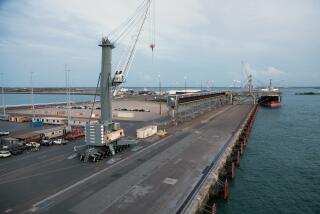The Pacific : China Providing Clues With Shanghai Property : Asia: Leases may show how Beijing will treat valuable Hong Kong real estate in 1997.
- Share via
HONG KONG — Hong Kong, watch carefully: This is how China might act when it inherits some of Hong Kong’s valuable government property in 1997 after taking over the British colony.
Shanghai’s municipal government has decided to lease some of the most famous, and potentially most prestigious, waterfront property in the world. And it is taking its time to make sure it gets things right.
The 37 buildings in question sit on the curving western bank of the Huangpu River. They were built in Western style when parts of Shanghai were ruled by the British and French in the 1920s and 1930s.
The 220 foreign firms, mostly banks, which used to be the tenants were thrown out by the communists in 1949, and since then, the municipal government has occupied most of the more famous buildings.
Now, as it seeks to become the financial capital of a China that will soon include Hong Kong, Shanghai wants foreign businesses back.
When the Chinese move into Hong Kong, they won’t find a historic core of prime real estate concentrated in the Central financial district. Still, between military and other government lands, they will come into a lot of property more valuable than they are used to dealing with.
China has been doing business with the outside world for years now and knows as well as anyone how to bargain. But this is different.
In trying to move top-of-the-line real estate, China is seeking advice from private consultants about how to lure foreigners back without charging too much or getting ripped off in the process.
There is plenty of money at stake. Estimates say a 50-year lease for some of the buildings could run as high as $150 million, but since none of the details of the leases or even the condition of the buildings have been made public, prospective tenants are noncommittal.
“We don’t even know if there’s heating in there,” said Pamela George of HSBC Holdings (5 HK), formerly the Hong Kong and Shanghai Banking Corp. In Shanghai’s capitalist boom times, Hong Kong Bank occupied the biggest building on the waterfront, which was called the Bund, a Hindi word for “embankment.”
*
Before they sign up for 50 years, prospective tenants want to know about subletting. “It’s huge,” George says of her bank’s old headquarters. “We don’t use nearly that much space now in Shanghai.”
A 50-year lease with a hefty land use premium on top of that ought to get a tenant the right to sublet to whomever he wants, but such a right is one of the things still under consideration.
The massive stone buildings, for all anyone knows, have not been tended to in over 40 years. Aside from normal upkeep, new tenants have to worry about where to put computers in places not designed for them.
“The efficiency of these buildings is extremely low. It’s by no means efficient compared to a modern building,” said Nelson Wong of Hong Kong property agent Viger’s.
“People should not go in to rush before they know what kind of deal they’re doing,” added Wong, who said his firm was “in very close consultations with the Shanghai government.”
Some of the other kinds of things Shanghai is still thinking about are: Who pays for modernizing a building? How much of the internal architecture can be altered? (The exteriors can’t be changed in any way.)
*
Helping the government to think about such questions are a variety of Hong Kong property agencies, brought in at Shanghai’s expense to pitch their services as evaluators and eventually maybe brokers too. “We can provide them the exposure to foreign investors,” said Charles Chan of agent Chesterton Petty.
Chan’s is one of several firms vying to evaluate the buildings in question, but the government is taking its time, having invited one Hong Kong property company to Shanghai just last weekend.
It will proceed with leasing just three of the buildings to start with, agents said. Maybe by October.
What happens if Shanghai can’t get the price it wants for the buildings? Will it lower its expectations as well as the asking price? Or will it just hang on to the buildings in the hope prices eventually rise?
In Hong Kong, where the property market leads the stock market and a public land auction gets more attention than the sayings of Gov. Chris Patten, this is of interest.
The stock market can and does plunge when prices fetched at auction are lower than expected, and those prices depend in part on what the government’s asking price is.
Knowing how the commercial property market works is important, and Shanghai seems to realize this. Whatever happens with the Bund properties, both Hong Kong and China stand to learn plenty about how the other side does business.
More to Read
Sign up for Essential California
The most important California stories and recommendations in your inbox every morning.
You may occasionally receive promotional content from the Los Angeles Times.













